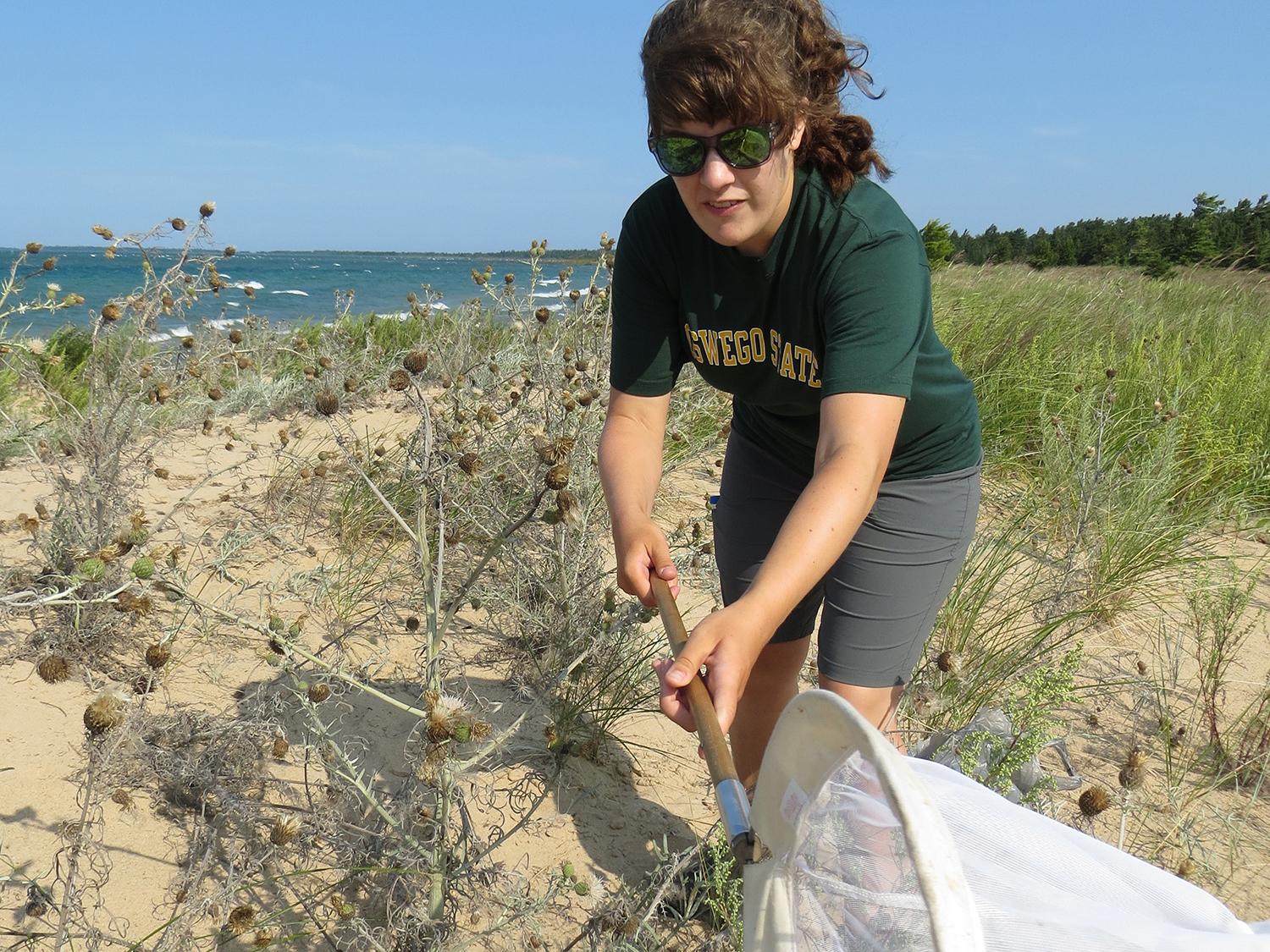Stephanie Facchine, a senior biological sciences major, studied how climate change might impact the rare, threatened Pitcher's thistle through a National Science Foundation Research Experience for Undergraduates Summer Fellowship at the University of Michigan Biological Station.
Stephanie Facchine, a senior biological sciences major, received a National Science Foundation Research Experience for Undergraduates (NSF REU) Summer Fellowship at the University of Michigan Biological Station this past summer. NSF REU programs are merit-based, competitive programs that draw from a national pool of applicants. Facchine conducted ecological research under the direction of several faculty from around the nation. Her research project focused on the effects of climate change in the Great Lakes region, in particular on aspects of pollination biology for the rare, federally threatened Pitcher's thistle. This thistle is found on sand dunes around lakes Michigan, Huron and Superior and nowhere else in the world.
Alok Kumar of physics, in collaboration with Scott L. Montgomery of the University of Washington, Seattle, published an article, “Islamic Science’s India Connection,” in AramcoWorld, September 2017. This international magazine is sponsored by Saudi Arabian Oil Company. From the mid-10th century CE, one of history’s great scientific eras began to flourish across Islamic lands, Kumar said. Like the European Renaissance, it was marked as much by cultural exchange, synthesis and dialog as it was by individual discovery. Connections forged among scholars and scientists of Islamic lands with contemporaries and predecessors beyond their own borders led to an unprecedented pooling of knowledge over generations and continents. The Indus Valley and the wider Indian subcontinent proved to be deep wells of the scholarship that gradually came to be known westward via translation into Arabic as well as Persian, Kumar noted, and this article provides specific examples of these exchanges from the disciplines of philosophy, mathematics, astronomy and medicine.
John Lalande II, professor of modern languages and literatures, taught German this past summer for six weeks in Graz, Austria, at the American Institute of Musical Studies. While there, Lalande conducted research on various aspects of Austrian culture, including castles (Strechau and Schlossberg), the Mauthausen concentration camp and monasteries (St. Florian and Admont).
Tracy K. Lewis of the department of modern languages and literatures traveled in August to a symposium in Asunción, Paraguay, for the release of his new Guarani-language translation of the Paraguayan writer Juan Manuel Marcos' book of poems, “Poemas y canciones.” This publication is considered a milestone in Paraguayan and Latin American literary history, as it apparently represents the first time a person not from the Southern Cone region has produced a Guarani translation of a major work of literature. At the same symposium, Lewis also delivered a paper on the 30th anniversary of Marcos' novel “El invierno de Gunter.” In June, Lewis was one of the invited Spanish-language poets at the 25th Maratón de Poesía in Washington, D.C. The event included readings by the invited poets at the Library of Congress and, the following day, in the Spanish Embassy. The poems were also published in an anthology that was donated, along with other books by the invited poets, to the Library's Hispanic Division.
Ulises A. Mejias, professor of communication studies, reported the following recent publications and scholarly activities:
-
Mejias and co-author Nikolai Vokuev (Syktyvkar State University, Russia) published Disinformation and the Media: The case of Russia and Ukraine in Media, Culture and Society (SAGE Journals).
-
An abridged version of Mejias' book "Off the Network: Disrupting the Digital World" (2013, University of Minnesota Press) was published in Spanish by the Center for Digital Culture, in Mexico City.
-
During the summer, Mejias was invited to teach at the St. Petersburg Institute of Linguistics, Cognition and Culture (NYI) in Russia, and at the Sixth Academic Camp on “New Media and Justice Communication in the Global Information Society” at Fudan University in Shanghai, China.
-
Mejias received a grant from LINGOs to build a prototype for his "algoritmi.global" project. Part media literacy project and part citizen science experiment, the online platform will allow Oswego students and people anywhere in the world to collectively engage in the empirical analysis of social computing algorithms.
-
Mejias was elected to join the Board of Directors of Humanities New York (formerly the New York Council for the Humanities), a National Endowment for the Humanities partner whose mission is to encourage critical thinking and cultural understanding in the public arena.
Ampalavanar Nanthakumar, professor of mathematics, contributed an article, "A copula-based test for a two component bivariate mixture distribution" to the American Journal of Statistics and Probability.




